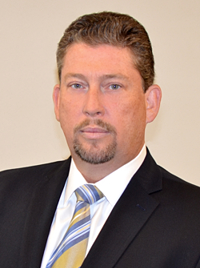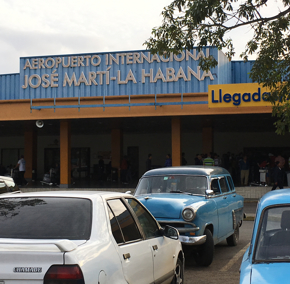"Bullishly skeptical" on Cuba: interview with Rob Kemp


Robert Kemp founded DRT Transportation was part of a group that visited Cuba earlier this year.
The day before President Obama's historic March 21 visit to Cuba, a group of 18 U.S. logistics practitioners, accompanied by three executives of the Transportation Intermediaries Association (TIA), arrived on the island for a mission that, while not nearly as symbolic, may be more significant. The group spent five days observing Cuba's infrastructure and gauging the country's ability to handle the potential acceleration of logistics demand to support American businesses if the U.S. trade embargo with Cuba is fully lifted.
One member of the entourage was Robert Kemp, founder and president of DRT Transportation LLC, a third-party logistics service provider (3PL) based in Lebanon, Pa. A natural entrepreneur, Kemp seems right at home in a country where business risk-taking is a daily activity. But Kemp is also a pragmatic businessman responsible for his customers' lifeblood: their goods. Kemp sees the chance to get in on the ground floor of a market of 12 million, many of who will have access to U.S.-made goods for the first time. But he sees Cuba for what it is today: a nation with great potential and with a competitive seaport, but with little else, including the disposable income its consumers will need to buy U.S. exports.
In an interview with Mark B. Solomon, executive editor-news, Kemp talks about his experience, the opportunities, and why he is (in our words, not his) "bullishly skeptical."
Q: Cuba wants to be a cross-dock point for imports moving through the expanded Panama Canal and bound for U.S. markets, especially the New York metro area. That potentially means a lot of cargo headed for Havana. Is that doable?
A: It is, conceptually. The Port of Mariel is a modern facility that has on-dock rail capabilities. We were told it could scale up its capacity without physically expanding. Investors in the port envision it as a cross-dock location for imports coming through the canal and bound for the East Coast and Europe. Miami is the closest U.S. deepwater point, but it is too far from the Northeast's dense populations.
Q: Do you sense that DRT's customers are eager to do business in Cuba? Or is there a reluctance to step into the market?
A: "Eager" is a strong word. We have discussed this with some of our key customers, and the responses have been all over the board. The market opportunity exists. With a population of about 12 million, Cuba is as big as Greater Los Angeles. It would benefit from the modernization that can come with improved trade relations with the U.S. Solving the socioeconomic challenges seems improbable in the short term. Having cruise ships dock in Havana for a day is a long way from total trade.
Q: Virtually no U.S. transport and logistics practitioner has done business in Cuba. If a U.S. company makes the leap, what should it brace itself for?
A: Unfortunately, after Mariel, the infrastructure rapidly deteriorates. The preferred method to move goods across the island is port to port, which illustrates how poor the road infrastructure is. Most containers move on flatbed trucks because there are virtually no available chassis. Container dwell times can hit 21 days, unheard of in the U.S. Yet these challenges represent opportunities for the right companies. Port operator PSA International projected that Mariel could almost triple its current TEU (twenty-foot equivalent unit) capacity without needing to actually expand. We were told that Mariel handled close to 300,000 TEUs in 2015, and as noted earlier, the port was built with a plan to expand its TEU capacity.
Q: What else struck you, positively and negatively, about the condition of Cuba's transport system?

Cuba's famous 1950s-era cars are kept in operating condition with imported parts and metal fabricated on the island.
A: What surprised me was the state of the total infrastructure, not just as it related to freight and logistics movement. Most Cubans use public transportation. Import duties on automobiles make it virtually impossible to own a finished automobile. The classic 1950s cars that seem frozen in time and that many Americans associate with post-revolutionary Cuba are almost exclusively taxis now. They are maintained by an amazing system of imported parts and by metal "artists" that fabricate their own parts. The taxi owners are immensely proud of the condition of their cars. It is a highlight of Havana.
Q: U.S. businesses are lagging behind their counterparts from other countries that never imposed a trade embargo on Cuba. Will U.S. companies find it difficult to dislodge established non-U.S. providers?
A: I don't believe U.S. firms will have difficulty competing in Cuba if the embargo is lifted. The U.S. has a huge nearshoring advantage. It seems that most countries currently trading with Cuba do not have a large presence there. Our collective capabilities should serve us well given that Cuba's energy, civil engineering, and telecommunications ecosystems are stuck in the 1950s.
Q: What advice would you give a U.S. logistics provider that's interested in doing business there?
A: Align yourself with local asset-based partners serving the island. The reason is that there are still countless legal and regulatory questions about doing business there. For example, can U.S. logistics companies open offices in Cuba, or will they be required to use one of the three current government-owned freight forwarders like Transcargo? That's just one of many questions. You want to partner with someone who knows the local ways and means.
U.S. companies also need to understand how the currency works. Foreign companies would deal with the Cuban convertible peso (CUC), while locals would still transact in Cuban pesos. Foreign companies would pay the government in CUC currency, and the government would then pay the employees in Cuban pesos. Essentially, the currency conversion is a tax kept by the government. I know that as the landscape changes, logistics associations like TIA will play an important role in facilitating such an important endeavor.
Q: In your discussions with Cuban officials, did you get any clarity on when the country could be ready to hit the regional or global trade stage?
A: Cuba feels it's ready now. The investments in Mariel and the passing of the "Law of Foreign Investment," which opened up Cuba to foreign investors, are the catalysts. The newly established Mariel Special Development Zone (ZEDM) already has established businesses that have 100 percent foreign investment. A Belgian logistics company handles shipments at the port. We also saw a few warehouses going up that were being built exclusively with foreign capital. Previously, foreign companies looking to serve Cuba had to partner with the government to gain a foothold.
Q: Given the impoverished state of the Cuban economy, how can the Cuban people afford to pay for Western-style goods?
A: With all Cuba's potential, nothing economically sustainable can occur until the income question is addressed. We were told the average Cuban earns about 540 Cuban pesos per month, which is equivalent to about US$20. Prices of most foodstuffs are kept artificially low. But disposable income for consumables is a luxury.
Q: Fidel Castro is an aging figurehead, while his brother, President Raul Castro, is also up in years and has said he will step down in 2018. Do you foresee a liberalization of trade activity once they are gone from the scene and a younger generation of leaders takes their place?
A: Regardless of what government is in power, the key policy issue is and will continue to be how Cuba's debt obligations are served and how its credit standing is addressed. Can the current Cuban government, or its future governments, improve the country's creditworthiness? That issue as well as others that go beyond transportation and logistics are for the governments and international organizations to address. My focus is to understand Cuba's changing landscape and to be prepared to serve DRT's customers if and when the time comes.
Related Articles

Copyright ©2024. All Rights ReservedDesign, CMS, Hosting & Web Development :: ePublishing